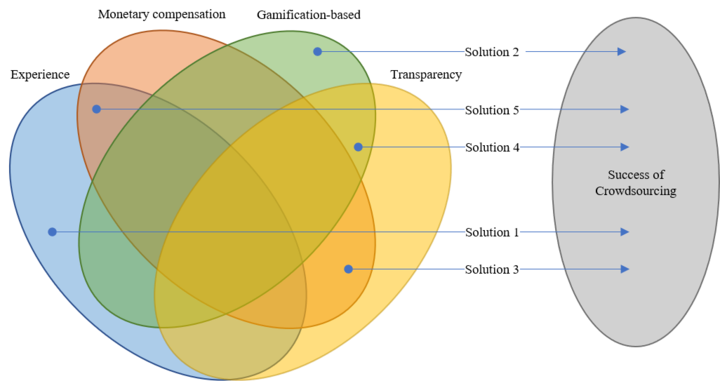
Badges and other gamification elements as indicators of trustworthiness: Investigation of crowdsourcing campaigns
Several marketplaces employ different markers, symbols and indicators for vendor trustworthiness, such as star-ratings based on customer feedback, indicators of tenure of the vendor on the platform or other quality certifications accredited by external evaluators. A new surprising entry to the palette of indicators available for signaling ones’ trustworthiness on marketplaces has become ones’ performance in a game, or in other words, faring well in gamification of the platform. So too is the case for example on crowdsourcing platforms where the task provides are attempting to boost their credibility and prominence as trustworthy and well-paying crowdsourcers.
Therefore, in this study we wanted to investigate how these gamification-based signals would fare against other facets of why people choose to complete tasks of a specific crowdsourcers. Past literature has already investigated the level of monetary compensations, governance capabilities of the crowdsourcer as well as communication quality as predictors of crowdsourcing campaign success. However, being able to show intricate avatars, cool badges and other gameful indicators of performance on the platform on the crowdsourcer profile had not yet significantly peaked the interest of the corpus focused on market dynamics.
Related work from the Gamification Group on the role of gamfication in dynamics of markets:
- Hamari, J. (2013). Transforming homo economicus into homo ludens: A field experiment on gamification in a utilitarian peer-to-peer trading service. Electronic commerce research and applications, 12(4), 236-245.
- Hamari, J. (2017). Do badges increase user activity? A field experiment on the effects of gamification. Computers in human behavior, 71, 469-478.
- Morschheuser, B., Hamari, J., Koivisto, J., & Maedche, A. (2017). Gamified crowdsourcing: Conceptualization, literature review, and future agenda. International Journal of Human-Computer Studies, 106, 26-43.
- Morschheuser, B., Hamari, J., & Maedche, A. (2019). Cooperation or competition–When do people contribute more? A field experiment on gamification of crowdsourcing. International Journal of Human-Computer Studies, 127, 7-24.
- Xi, N., & Hamari, J. (2020). Does gamification affect brand engagement and equity? A study in online brand communities. Journal of Business Research, 109, 449-460.
More specifically, to contribute to filling this dearth in our knowledge, we investigated which indicators of trustworthiness on crowdsourcers’ profiles (gamification-based, transparency, and experience) and level of monetary compensation predict crowdsourcee participation and consequent crowdsourcing campaign success. We employed both the Structural Equation Modelling (SEM) approach combined with the fuzzy set Qualitative Comparative Analysis (fsQCA) approach, which can explain more completely the linear and combination effects between factors. Specifically, this study examined the effects of indicators on crowdsourcers’ profiles that reveal information about the crowdsourcers, their tenure as crowdsourcing providers as well as the level of monetary reward on the popularity and consequent success of crowdsourcing projects using 101 data sources collected on the well-known Chinese crowdsourcing platform Xiao Yu’er.
The results reveals that gamification-based indicators of trustworthiness were positively associated with task popularity and further successfulness of the crowdsourcing task. Furthermore, in addition to profile credibility based on gamification-based indicators being sufficient, combinations of money with transparency and money with experience can substitute lack of other indicators as way to signal sufficient credibility. The specific combination of factors that have a significant impact on success of crowdsourcing are shown in the following figure.
Figure. 1. Venn diagram for the fsQCA solution
Graphical illustration: Five configurations were consistently linked to the cases featured in the set of successfulness for crowdsourcing. The first configuration (Solution 1) shows that rich experience sufficiently leads the crowdsourcing task to completion, even in the presence of a lack of gamification-based indicators and monetary compensation; The second configuration (Solution 2) suggests that in the absence of monetary compensation and experience, the crowdsourcer must exhibit plenty of gamification-based indicators to attract participants; The third configuration (Solution 3) suggests that proper monetary compensation and transparency can offset the deficiency of experience and gamification-based indicators; The fourth configuration (Solution 4) indicates a channel for task achievement in the presence of gamification-based indicators and transparency, despite a lack of monetary compensation; Without the gamification-based indicators, the final configuration (Solution 5) combined with the presence of monetary compensation and experience leads to the successfulness of a crowdsourcing task.
The results appear to support the view that within the crowdsourcing platform, the gameful dynamics of the community gain significant prominence so that beyond the commonplace indicators of vendor credibility, it is the kind of intra-community gamer capital that may outshine the more traditional indicators. Possible as they may include and imbue explicit and implicit community values and culture.
The findings of the study can provide valuable inspiration and suggestions for practice for designing incentive mechanisms for crowdsourcing platforms, promoting the formation of healthy trust relationships between crowdsourcers and participants, and solving the problem of information asymmetry problem among them.
What determines the successfulness of a crowdsourcing campaign: A study on the relationships between indicators of trustworthiness, popularity, and success
Yang Wu
Reference: Xu, Hui, Yang Wu, and Juho Hamari. “What determines the successfulness of a crowdsourcing campaign: A study on the relationships between indicators of trustworthiness, popularity, and success.” Journal of Business Research 139 (2022): 484-495. DOI: 10.1016/j.jbusres.2021.09.032.
See the paper for full details:
Abstract
Crowdsourcing has risen as a prominent way to outsource work to people reachable online. A critical predictor for the success of crowdsourcing campaigns on the market depends on the crowdsourcer’s ability to signal credibility towards the potential workers. Therefore, this study investigates which indicators of trustworthiness on crowdsourcers’ profiles (gamification-based, transparency, and experience) and level of monetary compensation predict crowdsourcee participation and consequent crowdsourcing campaign success. This study analyzes data of 101 crowdsourcing tasks from a popular Chinese crowdsourcing platform “Xiao Yu’er”. We employ the methods of Structural Equation Modelling and fuzzy set Qualitative Comparative Analysis to find out that gamification-based indicators of trustworthiness were positively associated with task popularity and further successfulness of the crowdsourcing task. Furthermore, in addition to profile credibility based on gamification-based indicators being sufficient, combinations of money with transparency and money with experience can substitute lack of other indicators as way to signal sufficient credibility.





Sorry, the comment form is closed at this time.